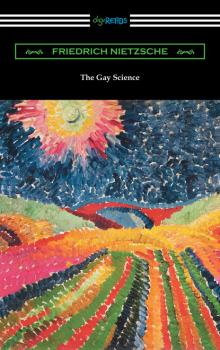Friedrich Nietzsche
Список книг автора Friedrich NietzscheThe Case of Wagner and Nietzsche Contra Wagner
"The Case of Wagner" is a critique of German composer Richard Wagner in which Friedrich Nietzsche makes a very public split with the musician. Nietzsche found himself at odds with Wagner's increasing involvement in the Völkisch movement and anti-Semitism. The critique of Wagner is something that is seen throughout Nietzsche's work, beginning with «The Birth of Tragedy», wherein he praised Wagner as fulfilling a need in music to go beyond the analytic and dispassionate understanding of music. Further praise for the musician can be found in Nietzsche's essay 'Wagner at Bayreuth', contained in «Untimely Meditations». However in «Human, All Too Human», Nietzsche begins to express his disillusion with Wagner the composer and the man. «The Case of Wagner» was one of the last works authored by Nietzsche. It was followed by «Nietzsche contra Wagner», also included in this edition, in which Nietzsche summarizes his criticisms of Wagner from his previous writings.
The Untimely Meditations (Thoughts Out of Season Parts I and II)
Written between 1873 and 1876, The «Untimely Meditations», or «Thoughts out of Season» is a collection of four essays by famed philosopher Friedrich Nietzsche. In the first essay 'David Strauss: the Confessor and the Writer', Nietzsche attacks David Strauss's «The Old and the New Faith: A Confession». In the second essay 'On the Use and Abuse of History for Life', Nietzsche presents an alternative way of reading history, one where living life becomes the primary concern. In the third essay 'Schopenhauer as Educator', Nietzsche describes how the philosophic genius of Schopenhauer might bring on a resurgence of German culture. In the fourth and final essay 'Richard Wagner in Bayreuth', Nietzsche investigates the music, drama and personality of Richard Wagner. Nietzsche originally planned this work to comprise thirteen essays but it is suggested that he lost interest in the work after writing just four. In this early philosophical work one can begin to see the development of a brilliant philosophical mind, which would become more evidenced by his later works.
Beyond Good and Evil
"Beyond Good and Evil" is Nietzsche at his best. In the book the philosopher attempts to systematically sum up his philosophy through a collection of 296 aphorisms grouped into nine different chapters based on their common theme. For the reader who has yet to discover Nietzsche in this translation by Helen Zimmern will be found a fabulous introduction. For those who have already discovered Nietzsche here you will find the opportunity to understand the whole of Nietzsche's philosophy.
The Antichrist
Friedrich Nietzsche's «The Antichrist» might be more aptly named «The Antichristian,» for it is an unmitigated attack on Christianity that Nietzsche makes within the text instead of an exposition on evil or Satan as the title might suggest. In «The Antichrist,» Nietzsche presents a highly controversial view of Christianity as a damaging influence upon western civilization that must come to an end. Regardless of ones religious or philosophical point of view, «The Antichrist» makes for an engaging philosophical discourse.
Ecce Homo
“Ecco Homo: How One Becomes What One Is” is an insightful reflection by Friedrich Nietzsche upon his own life and his impact on the world of philosophy. The work, the last original work he wrote, was written in 1888, weeks before the onset of the insanity that would plague him until his death in 1900. Not published until 1908, “Ecce Homo” is an autobiography of sorts and Nietzsche offers his personal perspective and criticism on his various philosophical works, such as “Thus Spoke Zarathustra”, “Beyond Good and Evil”, “The Twilight of the Idols”, and more. In this revealing and self-aware book the reader gains great insight into how Nietzsche weighed his previous works and their significance in history, as well as an intimate look at how he saw himself as both a human and a philosopher. He is surprisingly self-deprecating and sardonic and refreshingly does not take himself as seriously as one may imagine. He gives his last opinions on his many enemies and ends with a final reiteration of his core philosophy, a rejection of the Christian ideal that asserts suffering as a noble necessity of life and of Christianity as the bastion of supreme morality. This edition includes a biographical afterword, an introduction by translator Anthony M. Ludovici, and an appendix of some of Nietzsche’s final poetry.
The Will to Power
First released in 1901, about one year after Nietzsche’s death, “The Will to Power” is a collection of Nietzsche’s unedited and unpublished writings. Though the title and all of the ideas are of the radical philosopher’s own invention, the order and selection of Nietzsche’s notebooks are due to the organization of his sister. As a result of his poor health, Nietzsche used his remaining energy to write a different work, leaving “The Will to Power” in the earliest stages of writing. The topics he explores vary widely and include nihilism, religion, morality, the theory of knowledge, and art. Some ideas are reflected in the works Nietzsche managed to complete in his lifetime, while others show his progression from those ideas in his earlier life. Overall, “The Will to Power” is an opportunity to read the intellectual journaling of one of the nineteenth century’s most brilliant thinkers. Collected together here are both posthumously published volumes I and II as translated by Anthony M. Ludovici. This edition is printed on premium acid-free paper.
The Birth of Tragedy (translated by William A. Haussmann)
German philosopher, Friedrich Nietzsche was one the most controversial figures of the 19th century. His evocative writings on religion, morality, culture, philosophy, and science were often polemic attacks against the established views of his time. First published in 1872, “The Birth of Tragedy” is the author’s classic work on dramatic theory. It was the author’s first published work in which he exhibited his enthusiasm for the dramatic works of Aeschylus and Sophocles. In the dramatic works of classical antiquity, Nietzsche found a life-affirming philosophy arising from what is otherwise a tragic and meaningless world. Introduced here is the intellectual dichotomy between the Dionysian and the Apollonian dramatic traditions. The sons of Zeus, Apollo and Dionysus, respectively represented the traits of reason and emotion. Nietzsche argues that the conflict between these two characteristics is central to the human condition and the brilliance with which the Ancient Greeks dealt with this conflict was the principal quality contributing to their excellence. Harshly criticized in its time, Nietzsche would later recognize, in a prefatory essay, the work as a product of youthful naiveté when he reissued it in 1886. This follows the translation of William A. Haussmann and includes a biographical afterword.
The Gay Science: With a Prelude in Rhymes and an Appendix of Songs
First published in 1882 and revised in 1887, “The Gay Science” was written at the peak of Nietzsche’s intellectual abilities. It includes a large number of poems and an appendix of songs, all written with the intent of encouraging freedom of the mind. With praise for the benefits of science, intellectual discipline, and skepticism, “The Gay Science” also exhibits an enthusiastic affirmation of life, drawing from the influence of the Provencal tradition. Nietzsche additionally explores the notion of power and the idea of eternal recurrence, though not in a systematic way. This work is noted for one of Nietzsche’s most famous quotations, “God is Dead”, a phrase which figuratively expresses the idea that the Enlightenment had killed the possibility for a rational belief in God by modern society. Described by the philosopher himself as “perhaps my most personal book”, this work is worthy of attention from anyone with an interest in moral philosophy and the most essential themes and views of Friedrich Nietzsche. This edition is follows the translation of Thomas Common, includes an introduction by Willard Huntington Wright, and a biographical afterword.
Twilight of the Idols and The Anti-Christ (Translated by Thomas Common with Introductions by Willard Huntington Wright)
One of the most controversial and inflammatory philosophers in western civilization, Friedrich Nietzsche summarized his extraordinary ideas in “The Twilight of the Idols.” Appropriately subtitled “How One Philosophizes with a Hammer,” this work is a polemic on many of the ideas of his day, especially what he describes as the ‘The Problem of Socrates’ and ‘The Four Great Errors.’ Through the process of self-deception Nietzsche discusses the tendency of man to confuse cause and effect. By examining the concepts of accountability and free will, as they relate to vice and morality, Nietzsche attacks the prevalent philosophical systems of his time. Written in just over a week, “The Twilight of the Idols,” prepares readers for the principles addressed in “The Anti-Christ.” Also written in 1888, it expands on Nietzsche’s blatant disagreements with institutional Christianity. Written to deliberately provoke the reader, Nietzsche’s philosophy is perhaps most shocking not in its frank negativity concerning nearly all aspects of humanity, but in the profound depth of its understanding of human nature and the optimism which subtly affirms the capabilities and possibilities of mankind. This edition is translated by Thomas Common, includes introductions by Willard Huntington Wright, and a biographical afterword.
The Genealogy of Morals (Translated by Horace B. Samuel with an Introduction by Willard Huntington Wright)
German philosopher, Friedrich Nietzsche was one the most controversial figures of the 19th century. His evocative writings on religion, morality, culture, philosophy, and science were often polemic attacks against the established views of his time. First published in 1887, “The Genealogy of Morals,” is a work which follows and expands upon the principles of his previous works, “Thus Spoke Zarathustra” and “Beyond Good and Evil.” In a preface and three interrelated essays, Nietzsche outlines his theories on the origins of our moral prejudices. “The Genealogy of Morals,” was written partly in response to his friend Paul Rée's book “The Origin of the Moral Sensations,” whose genealogical hypothesis of morality he found unsatisfactory. Nietzsche begins by reiterating in his first essay the historical conflict between socio-economic classes that has given rise to the varying definitions of good and evil. In the second essay, Nietzsche discusses the origins of the institution of punishment, asserting that it arises from a straightforward relationship between creditors and debtors. Lastly, in the third essay, the philosopher considers the meaning of ascetic ideals. A classic work of moral philosophy, “The Genealogy of Morals” is considered by many as one of Nietzsche’s finest. This edition follows the translation of Horace B. Samuel, includes an introduction by Willard Huntington Wright, and a biographical afterword.









